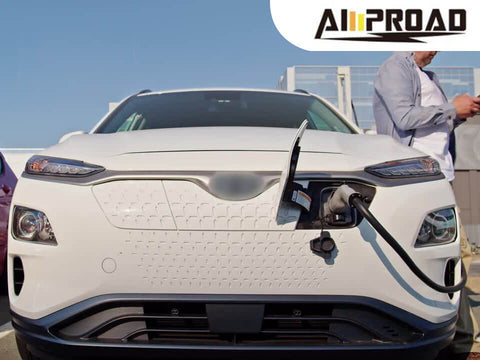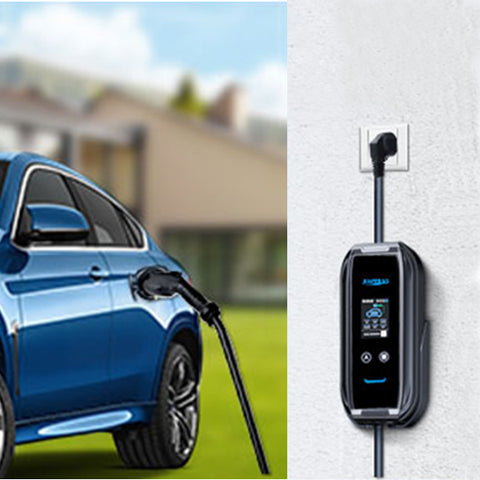
Are portable EV chargers a valuable addition to your electric vehicle (EV) toolkit? As the demand for electric vehicles continues to rise, the need for convenient and reliable charging solutions is more apparent than ever. In this article, we'll delve into the pros and cons of portable EV chargers to help you make an informed decision. From offering charging flexibility on-the-go to providing peace of mind during emergencies, portable chargers have their advantages. However, it's essential to consider factors like compatibility, charging speed, and safety features before investing in one. By exploring the practicality and effectiveness of portable EV chargers, you can determine whether they're a worthwhile investment for your EV charging needs. Let's explore whether portable EV chargers are truly beneficial or if they fall short of expectations.
What are portable EV chargers?
Portable EV chargers are compact devices designed to recharge electric vehicles (EVs) at any location with access to a power source. These chargers offer convenience by allowing EV owners to charge their vehicles wherever they have access to an electrical outlet. They are often compact and lightweight, making them easy to transport and store in a vehicle. Portable EV chargers typically come with a variety of connectors to accommodate different EV models and charging standards. While they may not provide charging speeds as fast as dedicated charging stations, portable chargers offer flexibility and peace of mind, especially during emergencies or when traveling long distances. Overall, portable EV chargers serve as a convenient solution for EV owners seeking flexibility and convenience in their charging routine.
Why are portable EV charger becoming popular?
Portable EV chargers are gaining popularity due to their convenience and versatility. As the adoption of electric vehicles (EVs) continues to grow, so does the need for accessible charging options. Portable chargers offer EV owners the flexibility to charge their vehicles wherever there is access to a power source, whether it's at home, work, or on the road. This convenience is particularly beneficial for EV owners who may not have access to dedicated charging stations or who need to charge their vehicles while traveling. Additionally, portable chargers provide peace of mind in emergency situations, allowing drivers to top up their battery levels if they run out of charge unexpectedly. With their compact size and ease of use, portable EV chargers are becoming an essential accessory for EV owners looking to maximize their charging options and ensure they can recharge their vehicles wherever they go.
Benefits of Portable EV Chargers
How do they offer charging flexibility?
Portable EV chargers provide charging flexibility by allowing electric vehicle (EV) owners to recharge their vehicles wherever there is access to a power source. Unlike fixed charging stations, which are typically located in specific areas, portable chargers can be used as home EV charger, work, or on the go. This flexibility enables EV owners to charge their vehicles whenever and wherever it's most convenient for them, whether they're running errands, visiting friends, or embarking on a road trip. Additionally, portable chargers often come with a variety of adapters and connectors, making them compatible with different EV models and charging standards, further enhancing their flexibility and usability.
Can they be used in emergency situations?
Portable EV chargers are invaluable in emergency situations, providing EV owners with a lifeline when they need it most. If an EV driver finds themselves stranded with a low battery or unable to reach a charging station, a portable charger can come to the rescue. By simply plugging the charger into a nearby power outlet, EV owners can replenish their vehicle's battery enough to continue their journey or reach a more suitable charging location. This can be especially helpful in remote areas where access to charging infrastructure may be limited or during power outages when traditional charging stations may be unavailable.
Do they provide convenience for EV owners?
Yes, portable EV chargers offer unparalleled convenience for EV owners. With a portable charger on hand, EV owners no longer have to worry about locating a charging station or adjusting their schedule to accommodate charging times. Instead, they can charge their vehicles whenever and wherever it's most convenient for them, whether it's at home, work, or on the road. This flexibility not only saves time and reduces stress but also allows EV owners to maintain their vehicle's battery levels without disrupting their daily routine. Additionally, the compact size and lightweight design of portable chargers make them easy to transport and store, further enhancing their convenience and usability for EV owners.
Considerations Before Buying
Are they compatible with all EV models?
Compatibility with different EV models is a crucial factor to consider when purchasing a portable EV charger. While many portable chargers are designed to be versatile and compatible with various EVs, it's essential to ensure that the charger you choose is compatible with your specific vehicle's charging port. Most electric vehicles use the J1772 charging standard for Level 1 and Level 2 EV charger, so look for a charger with a J1772 connector to ensure compatibility with your EV's charging port. Additionally, check the charger's specifications and compatibility list to confirm that it supports your EV model.
How fast do they charge?
The charging speed of a portable EV charger can vary depending on several factors, including the charger's power output and the EV's battery capacity. While portable chargers may not provide charging speeds as fast as dedicated charging stations, they offer convenience and flexibility for EV owners. Charging speed is typically measured in kilowatts (kW), indicating how quickly the charger can replenish the EV's battery. Higher charging speeds mean shorter charging times, so consider your charging needs and driving habits when selecting a portable charger.
What safety features do they have?
Safety is paramount when it comes to charging electric vehicles, so it's essential to choose a portable charger with robust safety features. Look for chargers with built-in protections such as overcurrent protection, overvoltage protection, and overheating protection to ensure safe and reliable charging. Additionally, consider chargers with features like a ground fault circuit interrupter (GFCI) and surge protection to protect against electrical hazards. By selecting a charger with comprehensive safety features, you can charge your EV with confidence, knowing that your vehicle and charging infrastructure are protected against potential risks.
Can portable EV charger be used for long-distance travel?
Yes, portable EV chargers can be used for long-distance travel, but their effectiveness may vary depending on factors such as charging speed and availability of power sources. While portable chargers offer convenience and flexibility for recharging electric vehicles (EVs) on the go, they may not provide the same charging speeds as dedicated charging stations like Tesla destination charger. As a result, long-distance travel with a portable charger may require more frequent stops for charging, extending the overall travel time. Additionally, the availability of power sources along the route can impact the feasibility of using a portable charger for long-distance travel. However, with careful planning and consideration of charging needs, portable EV chargers can still be a valuable tool for extending the range of EVs during long journeys.
Are portable EV chargers suitable for home charging?

Yes, portable EV chargers can be suitable for home charging, offering convenience and versatility for EV owners. The AMPROAD level 1 and level 2 dual-use portable EV charger, for example, is perfect for home charging, providing flexibility to charge your EV at home using standard household outlets or higher-powered charging stations. These chargers offer the convenience of charging your EV wherever you have access to a power source, whether it's in your garage, driveway, or backyard. Additionally, portable chargers eliminate the need for expensive installation or dedicated charging equipment, making them a cost-effective solution for home charging. With their compact size and ease of use, portable EV chargers are an excellent choice for EV owners looking for a convenient and reliable charging option at home.
- Environmental Impact
Do portable chargers promote sustainability?
Portable chargers contribute to sustainability by enabling more widespread adoption of electric vehicles (EVs). By providing convenient and accessible charging options, portable chargers help overcome one of the barriers to EV adoption, which is access to charging infrastructure. This encourages more people to switch to EVs, reducing reliance on fossil fuels and lowering greenhouse gas emissions. Additionally, portable chargers can be powered by renewable energy sources, further reducing their environmental impact.
How do they contribute to reducing carbon emissions?
Portable chargers play a crucial role in reducing carbon emissions by facilitating the transition to cleaner transportation options. By enabling EV owners to charge their vehicles using electricity, which can be generated from renewable sources such as solar or wind power, portable chargers help reduce reliance on gasoline and diesel-powered vehicles. This leads to a decrease in greenhouse gas emissions and air pollution, resulting in cleaner air and a healthier environment for everyone.
Are they part of the future of EV charging infrastructure?
Yes, portable chargers are likely to play an increasingly important role in the future of EV charging infrastructure. As EV adoption continues to grow, the demand for convenient and accessible charging solutions will also increase. Portable chargers offer a flexible and scalable option for expanding charging infrastructure, particularly in areas where installing fixed charging stations may be impractical or cost-prohibitive. Additionally, advancements in battery technology and charging infrastructure are making portable EV charger more efficient and reliable, further driving their adoption. With their ability to provide charging on-the-go, portable chargers are well-positioned to complement traditional charging infrastructure and play a significant role in the future of EV charging.
Challenges and Limitations
What are the drawbacks of portable chargers?
Despite their convenience, portable chargers have some drawbacks that users should consider. One limitation is their slower charging speeds compared to fixed charging stations, which can extend charging times, especially for EVs with larger battery capacities. Additionally, portable chargers may not always be compatible with all EV models or charging standards, limiting their usability for some drivers. Another drawback is their reliance on available power sources, which may not always be accessible in certain locations or during emergencies.
Are there any reliability issues?
Reliability can be a concern with portable chargers, particularly in terms of durability and performance. Some users have reported issues with the build quality of certain portable chargers, including frayed cables or malfunctioning connectors. Additionally, the performance of portable chargers may be affected by factors such as temperature extremes or fluctuations in power supply. While many portable chargers come with warranties or guarantees, reliability issues can still occur, impacting the overall user experience.
How do they compare to fixed charging stations?
Portable chargers offer convenience and flexibility, but they are not always a direct replacement for fixed charging stations. Fixed charging stations typically offer faster charging speeds and higher power output, making them more suitable for rapid charging and long-distance travel. Additionally, fixed charging stations are often equipped with additional features such as payment systems, monitoring capabilities, and amenities for EV drivers. However, portable chargers have the advantage of portability, allowing users to charge their EVs wherever there is access to a power source, making them ideal for home charging, emergency situations, or as a backup option for travel. Ultimately, the choice between portable chargers and fixed charging stations depends on the specific needs and preferences of EV owners.




